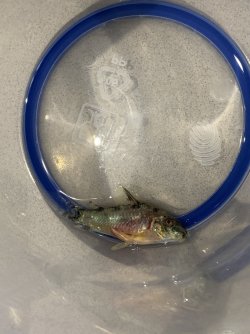Hello!
I’m relatively new to fishkeeping and new to this forum. I’d like to find out why my Peppered Cory died today!
I’ve had 2 Corys for around a month now and never had any issues, until this last week where they’ve stopped eating as much and have hidden away under some decor (the hiding wasn’t uncommon during the day). I came down to find one of the Corys had died overnight with some redness around the belly (pic attached).
Immediately did a water test but Ammonia, Nitrite and Nitrate are all 0. They tended to eat Tetra Micro Granules and King British Catfish pellets. The other Cory doesn’t have any redness and isn’t showing other symptoms of dying.
Is the death due to a disease or from under-eating? I’d like to know if the rest of my fish are in danger. I have a 120L tank with: 1 platy, 6 cherry barbs, 1 Cory and 3 Oticinclus.
Thanks!
I’m relatively new to fishkeeping and new to this forum. I’d like to find out why my Peppered Cory died today!
I’ve had 2 Corys for around a month now and never had any issues, until this last week where they’ve stopped eating as much and have hidden away under some decor (the hiding wasn’t uncommon during the day). I came down to find one of the Corys had died overnight with some redness around the belly (pic attached).
Immediately did a water test but Ammonia, Nitrite and Nitrate are all 0. They tended to eat Tetra Micro Granules and King British Catfish pellets. The other Cory doesn’t have any redness and isn’t showing other symptoms of dying.
Is the death due to a disease or from under-eating? I’d like to know if the rest of my fish are in danger. I have a 120L tank with: 1 platy, 6 cherry barbs, 1 Cory and 3 Oticinclus.
Thanks!


